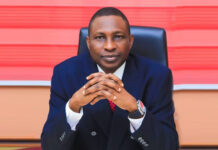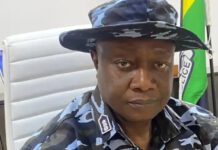
About eight months after former Director General of the Administrative Staff College of Nigeria (ASCON), Mr Ajibade Peters, retired, having served two terms of eight years and a total of 35 years in the institution, a new leader for the organisation is yet to emerge.
LEADERSHIP Friday gathered that the battle to replace Peters reached an epic proportion, with about 22 prospective applicants, 18 of whom were eligible to contest for the position.
This was said to have compelled the Head of Service of the Federation (OHSF), Winifred Ekanem Oyo-Ita, to intervene by setting up a panel to determine who will mount the saddle.
It was learnt that even after Mrs Oyo-Ita has initiated and completed the process for the appointment of a new Director General, ASCON is still being headed by Mrs C.U Gayya on acting capacity.
There has been internal wrangling within the management cadre of ASCON prior to the appointment of Peters in 2012, to the extent that petitions against him inundated the office of the Head of Service in Abuja.
But after the issue was cleared, OHSF sent a letter absolving him of any wrongdoing and directed that he continue to manage the affairs of the college. Subsequently, his appointment was renewed for another four year term.
However, in an exclusive interview with LEADERSHIP Friday, a member of the panel, who is also the Director General of the Center for Management Development (CMD), Dr Kabir Kabo Usman, assured that that in just a matter of time there would be a Director General in place for ASCON.
Usman said, “As far as I know, as at June or July, the former DG’s contract expired and immediately, one of the directors was actually asked to act pending his confirmation or the appointment of a new DG. I am glad to tell you that the Head of Service in this respect did an excellent job.
“What she did was to set an excellent process, with high level of integrity and high level of scrutiny. She set up a team of experts in the public sector to make sure that there is a process that is sincere, that is objective and that can stand the test of time”.
The panel, headed by Mrs Oyo-Ita, had as its members: former heads of service, the Director General of the National Institute of Policy and Strategic Studies (NIPSS), the Director General of the CMD, some permanent secretaries as well as the rector of the Defence Academy.
Usman described the composition of the panel as “really apt”, emphasising that they followed “a very rigorous process in terms of the selection of a successor of the former DG of ASCON.
He added that from the onset, Oyo-Ita took a stand that she was going to recruit the DG from inside ASCON.
He said, “There was a process whereby the candidates would have to do a presentation of five year development plan for ASCON and the second aspect was that they would have to be interviewed. The third aspect was that they have to undergo an examination.
“With all those processes that we undertook it is quite clear that it was extremely objective. The selection process was subject to scrutiny, validation and verification. Everybody was vetted by relevant security agencies”.
ASCON was established by the federal government through Decree No 39 of 1973, which was replaced by ASCON Act, CAP 6, Vol. 1 LFN 1990. Its critical function is to train “effective leaders at all levels of organisations in the country.”
The mission statement of the college reads: “As part of our renewed effort to continue to support and enhance the capacity and capability of these organisations, we have put measures in place to be a centre of excellence for the development of leadership in both public and private sector organizations. Our overarching aspiration, as the foremost management development institute in Nigeria, is to create a critical mass of leaders at all levels in the country with the burning passion, integrity, creativity, character, intellect and commitment to serve the country honestly, efficiently, diligently, honourably and professionally”.
The college has produced the highest number of PhD holders in the civil service since its inception in 1972.
Source: Leadership




